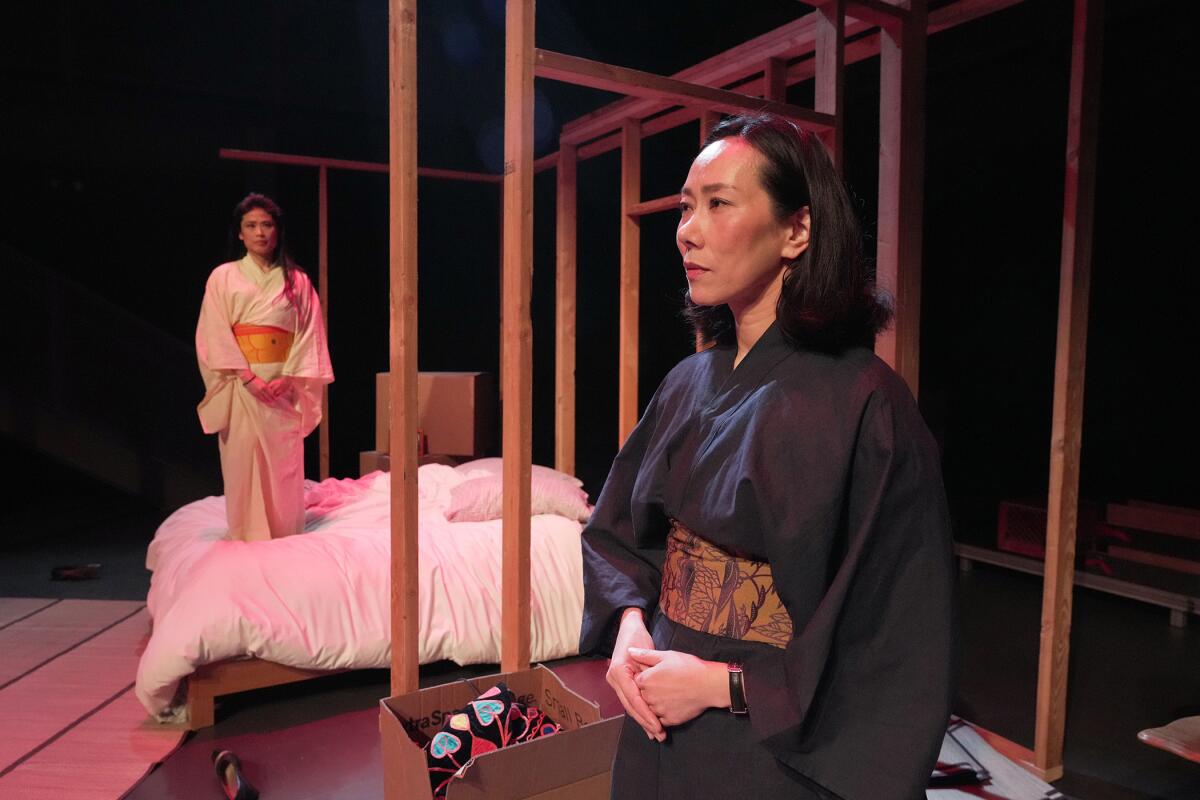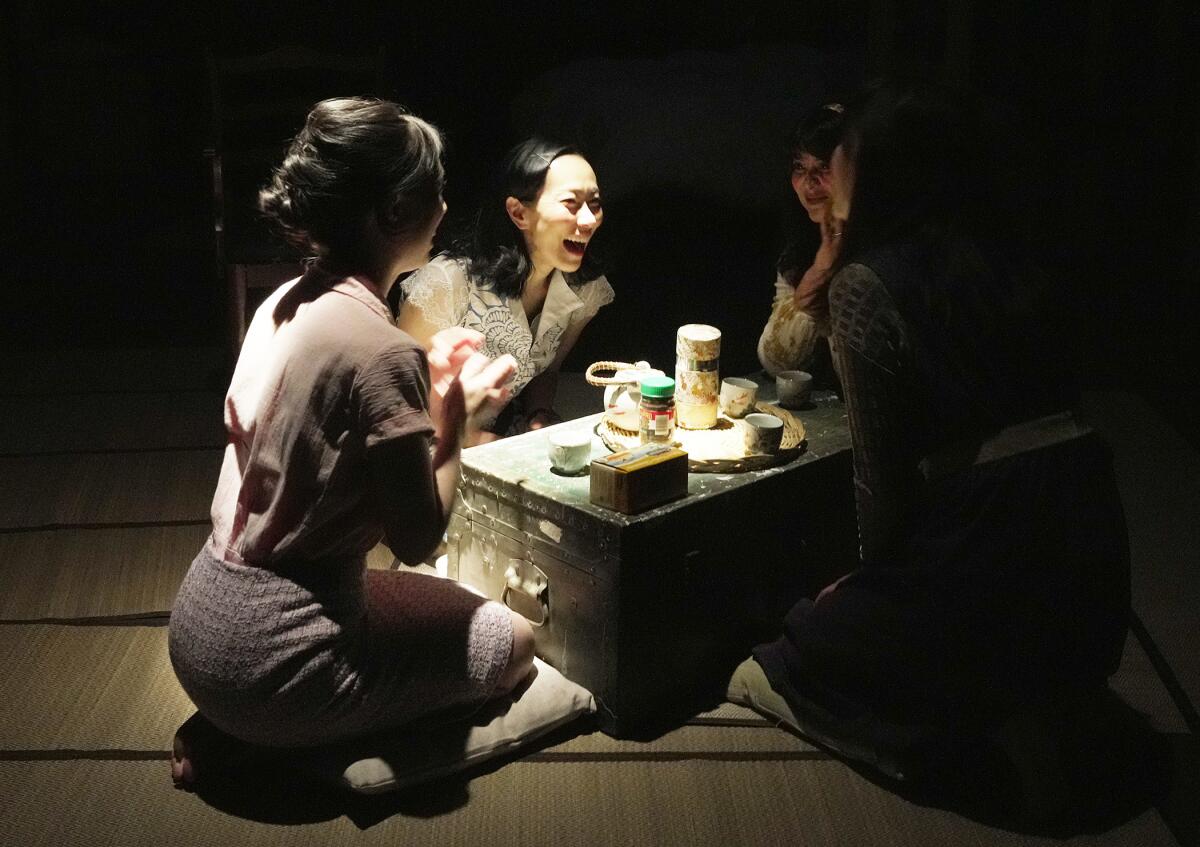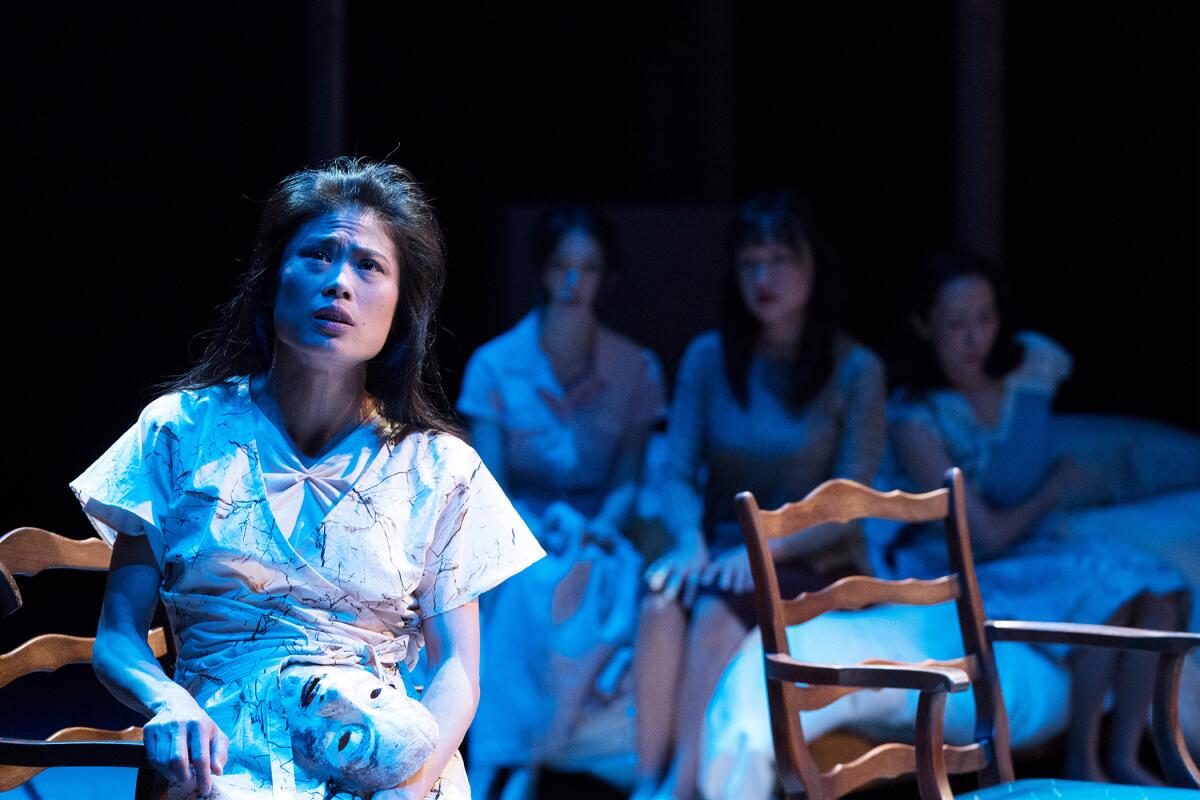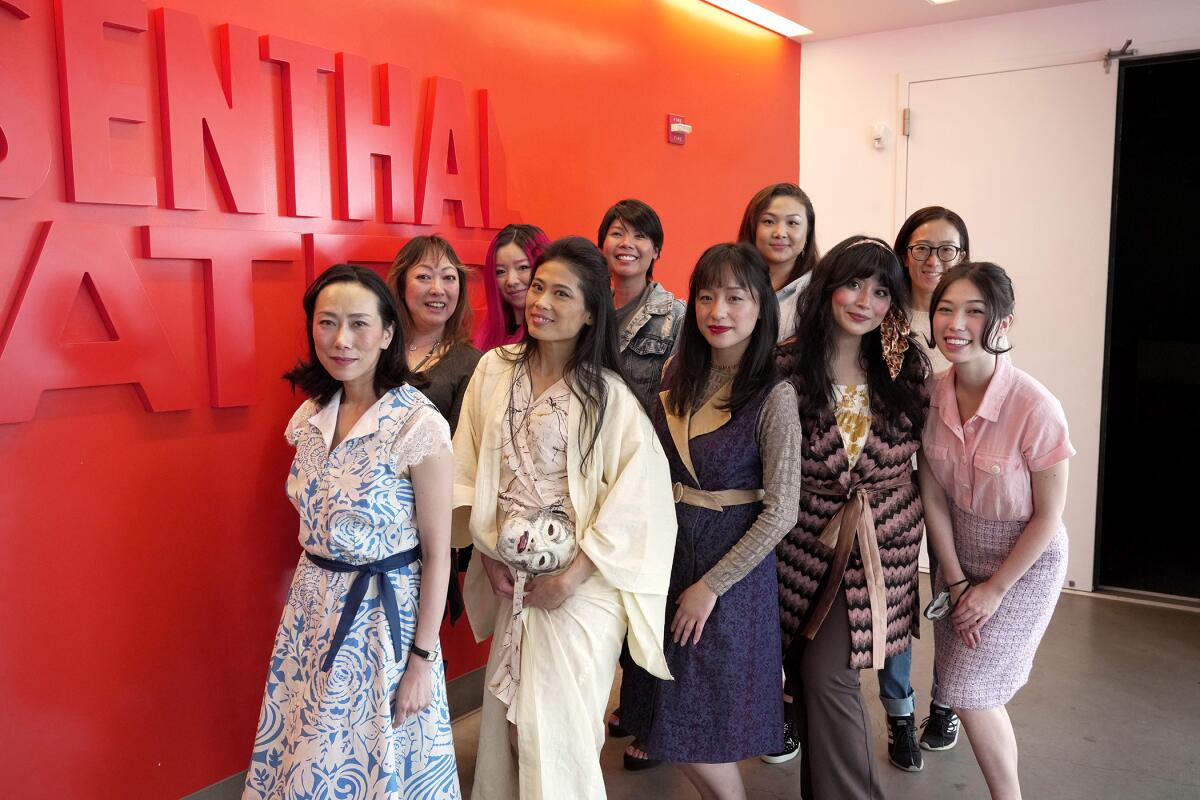Why Velina Hasu Houston’s timely play ‘Tea’ continues to be staged around the world

- Share via
Velina Hasu Houston’s play “Tea” starts with the death of a character. After Himiko Hamilton, a Japanese woman living in Ft. Riley, Kan., takes her own life, four of her friends, who belong to the same Buddhist church, gather to clean her house. Over cups of tea, they reminisce about the past and mourn Himiko’s death. “There’s a sense of guilt and shame and anger,” says Hua Lee, one of the actors who plays Atsuko, the head of the church. “We’re trying to find a way to honor her spirit.”
The friends recall how they met their American husbands during the United States’ occupation of Japan after World War II, and the adaptations they had to make after moving. They ask themselves if they could have done more for Himiko.
The play’s framework — centered on a group of women having tea together — was inspired by Houston’s own upbringing in Kansas. Her mother, Setsuko Takechi, a Japanese war bride like the five characters in “Tea,” gathered for tea once a month with her Japanese friends. As a young woman, Houston would help refresh their cups while absorbing their stories.

Since its debut at Manhattan’s Theatre Club in 1987, “Tea” has been produced around the world. Houston weaves into her play the experiences of her mother and other Japanese women who married American military personnel and immigrated to the United States during the 1950s. Houston’s parents met when her father, Lemo Houston, an African American soldier, was stationed in Japan after WWII. Following a long courtship, Houston and Takechi got married — despite both families’ strong disapproval of the relationship.
L.A.’s Hero Theatre, which puts on productions at Rosenthal Theater at Inner-City Arts, originally planned to stage “Tea” two years ago before the COVID-19 pandemic shuttered theaters throughout the city. The theater has returned with its own spin on Houston’s work. Now showing through May 15, Hero’s staging of “Tea,” directed by Rebecca Wear, features two all-Asian casts.
It’s an especially timely look at racism, including that which can manifest within communities of color. “It’s always been sadly ironic to me that BIPOC people confront racism from whites, but seldom confront the racism that they exercise upon each other in myriad ways,” Houston says. “As someone who is both Asian and Black, I am stunned by the amount of anti-Blackness I encounter in the Asian and Asian American communities.”
In 1979, Houston moved to Southern California to pursue an MFA in playwriting, screenwriting and English at UCLA. She later earned a PhD in critical studies at USC, where she currently teaches. While pursuing her MFA Houston began working on “Tea,” her third play. After workshopping it with the Asian American Theatre Company in San Francisco, she launched it on the East Coast a few years later.
To research the play, Houston traveled back to Kansas, where she and her mother interviewed dozens of Japanese war brides. Takechi’s presence, coupled with the fact that she spoke Japanese, helped the women feel more comfortable speaking about their experiences. Over the course of nearly 50 interviews, the young playwright developed a deeper understanding of what these women had gone through.
She believes her mother drew much from the experience as well. “I think it was quite illuminating for [her] to see Japanese women living in towns where they were the only nonwhite person,” Houston says. “And also hearing different stories of how people had come to meet their American husbands and move to the United States and build a life for themselves.
“They were very emotional interviews, because the women were telling their stories fully for the first time. Sometimes their children sat in, and it was the first time they had heard the stories about their mother’s history.”
Some of the women spoke about grappling with the trauma of domestic abuse, a theme that also emerges in “Tea.”
“I was stunned by some of the things that they told me,” Houston says. “Probably the thing that most disturbed me was when a woman told me that her husband bit off part of her lip. I just have never forgotten that.”
Two weeks after completing the interviews, she finished the first draft of “Tea.”
The play’s five characters — Atsuko, Chizuye, Himiko, Setsuko and Teruko — were inspired by the women Houston interviewed. “Tea” moves back and forth in time, with Himiko showing up as a spirit or ghostly presence, often joining in the conversation as if she were still alive. Ghost characters often appear in Houston’s plays; she sees them as an element influenced by the Japanese stories, fairy tales and legends her mother told her growing up.

After its 1987 debut, “Tea” was staged by San Diego’s Old Globe the following year. In 1989, actress Olympia Dukakis presented it at the Whole Theater Company in Montclair, N.J. Dukakis invited the playwright to live with her and her family during rehearsals. Houston was there for eight weeks, and she and Dukakis became lifelong friends. “Her mother was an immigrant from Greece,” says Houston. “So there was this understanding of the struggle that immigrants go through to find a place for themselves in this country.” She says that Dukakis also encouraged her to write what she really wanted to, and not give in to commercial pressures.
Elisa Bocanegra, the founder and artistic director of Hero Theatre, also considers Dukakis a mentor. They met in 2011, when the two acted together in the Roundabout Theatre’s production of “The Milk Train Doesn’t Stop Here Anymore” in New York City. Bocanegra, who is Latina, felt discouraged about the limited scope of roles she was being offered. Dukakis encouraged the performer to start her own theater company. Bocanegra founded Hero later that year and eventually moved it to Los Angeles.
“Tea” is especially poignant for Bocanegra, as it reminds her “so much of my mom and aunts who came from Puerto Rico,” she says.“They themselves were also married to soldiers and came to the United States.” Bocanegra says she had always sensed “a loneliness and a sadness that they had, having left their own country and being considered an ‘other’ in America.”
The play features two casts, with one performing in the evening and the other during daytime shows. They did this for “a couple of reasons,” says director Wear. “First and foremost, there’s so much incredible talent out there, and we really wanted to give opportunities to all the actresses that we could.”
They also wanted to give the actors opportunities to take on other jobs if the occasion arose. “As other theater companies have recognized in Los Angeles,” says Wear, “there’s always a navigation for performers in terms of figuring out when to do theater and when to do television and film. So this kind of framework provides the support so that performers can actually do both as necessary.”

Wear also recognizes that “Tea” is arriving at a time when anti-Asian sentiments and hate crimes are on the rise in the United States. “At times, we’re inviting the audience in, and then at other points, we’re actually confronting them,” she says. “Playing between those impulses actually shaped every part of the show, from the staging to the way we handled accents to the sound.”
The sound design and original music by Dean Harada also reflect influences from Japanese ghost stories, Wear notes. In the opening scene, Himiko delivers a monologue, calling out to her dead husband, daughter and mother, before she takes her life offstage. The music underscoring the monologue is both haunting and jarring, and it mixes in sounds from traditional Japanese theater like wooden clappers and samisen, a traditional stringed instrument.
The actors have found personal resonance in the play in different ways. Tomoko Karina, one of the actors playing Himiko, was born in Japan and immigrated to the United States as a young adult. For her, it’s important that Houston’s play dismantles racist stereotypes about Japanese women as a monolith, instead giving the characters layered and nuanced stories. “War brides were not just prostitutes and bar girls,” Karina says. “Which I even thought. But that is not true.”
Lee, whose character is strong-willed and feels superior to the others, first encountered “Tea” while studying theater at UC Davis. Lee loved it so much that she wrote an essay about it. “If there’s any play I would have produced, it would be this one,” she says. “Velina’s writing is just so raw and honest. She’s unapologetic in her quest to explore the human experience and to put that out there.”
“A play like this is so timeless. It was relevant then, and it’s still relevant now.”
'Tea'
Where: Rosenthal Theater at Inner-City Arts, 720 Kohler St., Los Angeles.
When: 8 p.m. Thursdays, Fridays and Saturdays; 2, 7 and 8 p.m. Sundays. $35. Through May 15.
Info: herotheatre.org/tea.html
More to Read
The biggest entertainment stories
Get our big stories about Hollywood, film, television, music, arts, culture and more right in your inbox as soon as they publish.
You may occasionally receive promotional content from the Los Angeles Times.










